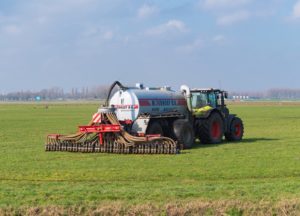By Katie Labonte, Managing Underwriter, and Megan Stephens, Assistant Vice President
 Biosolid application companies perform an important service for the livestock and farming industries across the country and play an integral part in one of the biggest reuse and recycle arrangements out there: taking the biosolid waste of livestock and applying it as fertilizer to fields. But with as straightforward as that may seem, the industry is not without its risks – to humans, to property, and to the environment.
Biosolid application companies perform an important service for the livestock and farming industries across the country and play an integral part in one of the biggest reuse and recycle arrangements out there: taking the biosolid waste of livestock and applying it as fertilizer to fields. But with as straightforward as that may seem, the industry is not without its risks – to humans, to property, and to the environment.
One of the most significant risks these companies face is when they are providing services for pumping manure out of barns or confined pits, typically those of hogs. If the manure is overly agitated during the pumping process, it releases toxic gases that can cause oxygen depletion in the surrounding area, which can lead to asphyxiation in both humans and the livestock within. In extreme cases, given the highly flammable nature of the gases, explosion can occur. Due to this potential issue, the company’s employees must vigilantly monitor the air quality within the confined space, carefully control the ventilation, and make sure to have standard procedures regarding who, if anyone, is allowed inside the space during the pumping process. This is just one reason why it is imperative that these companies have the right insurance coverage for their exposures.
Additional pollution exposures exist during the pumping process, but also in the transportation and application of the biosolids and/or manure. The biggest hauling-related hazard is the risk of a manure spill if an accident were to occur during transportation from the manure pit or lagoon to the application site. If the spill were to make its way into a stream or waterway, then natural resource damage to fish and other wildlife is all too likely. Additionally, manure run-off making its way into the groundwater is a potentially large exposure during the application process. However, proper training and licensure for application procedures can help to prevent such occurrences and are therefore essential for companies to obtain. Even with proper licensing, spill prevention procedures, and jobsite safety procedures, unforeseen accidents can take place and the cost of a claim could be devastating to the insured.
For biosolid applicator companies, we can offer an Environmental Combined Policy with General Liability and Contractors Pollution Liability packaged together, or we can offer a monoline Contractors Pollution Liability policy if the company’s General Liability coverage is already placed elsewhere.
- Contractors Pollution Liability (CPL) is intended to protect from third party claims for damages caused by pollution conditions arising from the insured’s covered and completed operations at a job location. Given the work they’re performing, Contractors Pollution Liability is indispensable for biosolid applicators. Furthermore, having this coverage is being required more and more often as part of a job contract.
- Transportation Pollution Liability (TPL) is intended to protect from pollution conditions caused by “over the road” transportation. It can cover insureds or third party carriers that transport products that could cause a pollution condition. This coverage can also include loading/unloading should the insured’s cargo create a pollution condition. Again, Transportation Pollution Liability is a crucial coverage for any of these companies that perform biosolid/manure hauling as part of their services.
It is important for agents to be aware of the exposures associated with these companies. And in an ever-changing marketplace, it’s good to know that there’s a place where this class of business can find the coverage it needs. For more information regarding biosolid pumping, hauling, and application companies, including claim scenarios and account submission information, contact us.
